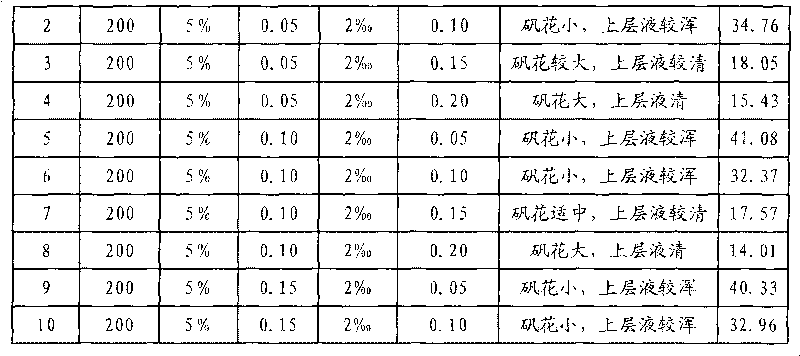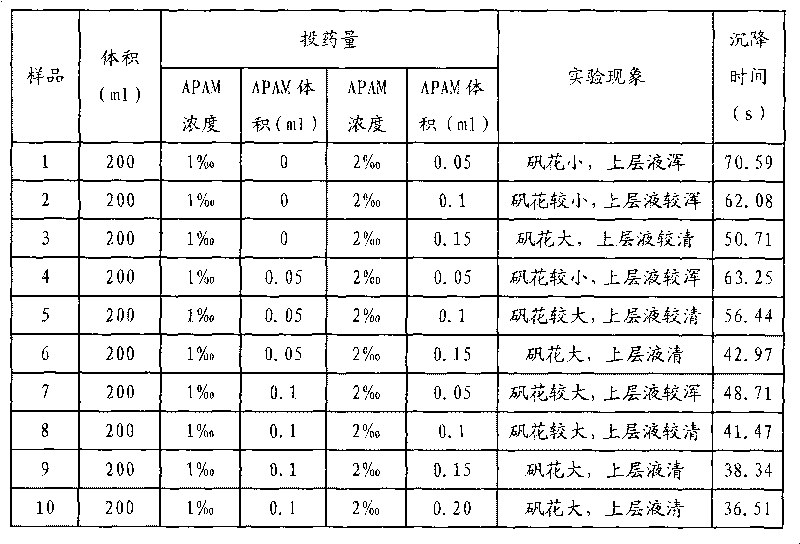Silt and sewage treatment method
A sewage treatment method, mud and sand technology, applied in water/sludge/sewage treatment, water/sewage multi-stage treatment, flocculation/sedimentation water/sewage treatment, etc., can solve the problem of long drying time, long sedimentation time, sludge High water content and other problems, to achieve high water purification efficiency and good water purification effect
- Summary
- Abstract
- Description
- Claims
- Application Information
AI Technical Summary
Problems solved by technology
Method used
Image
Examples
Embodiment 1
[0042] A mud sand sewage treatment method, the sewage is produced by washing crushed stones in a quarry, which contains a large amount of mud sand with a solid content of about 4%. In this embodiment, the sewage discharged from the production line is directly treated, and the sewage flows through the coarse sand separation device, the fine sand separation device, the primary flocculant adding device, and the secondary flocculant adding device. The above devices treat the sewage in sequence.
[0043] Firstly, sand separation is performed on the above-mentioned sewage, and the above-mentioned sand separation step includes a primary separation step and a secondary separation step. The primary separation step uses spiral centrifugation to separate the coarse sand in the sewage, and the secondary separation uses a cyclone group and a high-frequency vibration device to separate the fine sand in the sewage.
[0044] Preparation of anionic polyacrylamide solution: add water to a cont...
Embodiment 2
[0049] A mud sand sewage treatment method, the sewage is produced by washing crushed stones in a quarry, which contains a large amount of mud sand with a solid content of about 5%. In this embodiment, the sewage discharged from the production line is directly treated, and the sewage flows through the coarse sand separation device, the fine sand separation device, the primary flocculant adding device, and the secondary flocculant adding device. The above devices treat the sewage in sequence.
[0050] Firstly, sand separation is performed on the above-mentioned sewage, and the above-mentioned sand separation step includes a primary separation step and a secondary separation step. The primary separation step uses spiral centrifugation to separate the coarse sand in the sewage, and the secondary separation uses a cyclone group and a high-frequency vibration device to separate the fine sand in the sewage.
[0051] Preparation of anionic polyacrylamide solution: add water to the co...
Embodiment 3
[0056] A mud sand sewage treatment method, the sewage is produced by washing crushed stones in a quarry, which contains a large amount of mud sand with a solid content of about 4.5%. In this embodiment, the sewage discharged from the production line is directly treated, and the sewage flows through the coarse sand separation device, the fine sand separation device, the primary flocculant adding device, and the secondary flocculant adding device. The above devices treat the sewage in sequence.
[0057] Firstly, sand separation is performed on the above-mentioned sewage, and the above-mentioned sand separation step includes a primary separation step and a secondary separation step. The primary separation step uses spiral centrifugation to separate the coarse sand in the sewage, and the secondary separation uses a cyclone group and a high-frequency vibration device to separate the fine sand in the sewage.
[0058] Preparation of anionic polyacrylamide solution: add water to a co...
PUM
 Login to View More
Login to View More Abstract
Description
Claims
Application Information
 Login to View More
Login to View More - Generate Ideas
- Intellectual Property
- Life Sciences
- Materials
- Tech Scout
- Unparalleled Data Quality
- Higher Quality Content
- 60% Fewer Hallucinations
Browse by: Latest US Patents, China's latest patents, Technical Efficacy Thesaurus, Application Domain, Technology Topic, Popular Technical Reports.
© 2025 PatSnap. All rights reserved.Legal|Privacy policy|Modern Slavery Act Transparency Statement|Sitemap|About US| Contact US: help@patsnap.com



